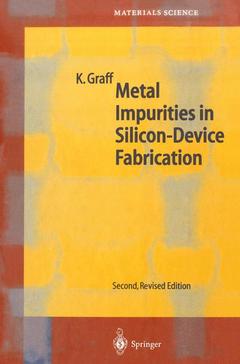Metal Impurities in Silicon-Device Fabrication (2° Éd., 2nd ed. 2000. Softcover reprint of the original 2nd ed. 2000) Coll. Springer Series in Materials Science, Vol. 24
Langue : Français
Auteur : Graff Klaus

Metal Impurities in Silicon-Device Fabrication treats the transition-metal impurities generated during the fabrication of silicon samples and devices. The different mechanisms responsible for contamination are discussed, and a survey is given of their impact on device performance. The specific properties of the main and rare impurities in silicon are examined, as well as the detection methods and requirements in modern technology. Finally, impurity gettering is studied along with modern techniques to determine the gettering efficiency. In all of these subjects, reliable and up-to-date data are presented. This monograph provides a thorough review of the results of recent scientific investigations, as well as the relevant data and properties of the various metal impurities in silicon. The new edition includes important recent data and a number of new tables.
1. Introduction.- 2. Common Properties of Transition Metals.- 2.1 General Behavior.- 2.2 Contamination of Silicon Wafers.- 2.3 Impact on Device Performance.- 3. Properties of Transition Metals in Silicon.- 3.1 Solubilities.- 3.2 Diffusivities.- 3.3 Dissolved Impurities.- 3.4 Precipitated Metals.- 4. Properties of the Main Impurities.- 4.1 Iron.- 4.2 Nickel.- 4.3 Copper.- 4.4 Molybdenum.- 4.5 Palladium.- 4.6 Platinum.- 4.7 Gold.- 5. Properties of Rare Impurities.- 5.1 Scandium.- 5.2 Titanium.- 5.3 Vanadium.- 5.4 Chromium.- 5.5 Manganese.- 5.6 Cobalt.- 5.7 Zinc.- 5.8 Zircon.- 5.9 Niobium.- 5.10 Ruthenium.- 5.11 Rhodium.- 5.12 Silver.- 5.13 Cadmium.- 5.14 Hafnium.- 5.15 Tantalum.- 5.16 Tungsten.- 5.17 Rhenium.- 5.18 Osmium.- 5.19 Iridium.- 5.20 Mercury.- 6. Detection Methods.- 6.1 Detection of Total Impurity Content.- 6.2 Detection of Dissolved Impurities.- 6.3 Detection of Precipitates.- 7. Requirements of Modern Technology.- 7.1 Reduction of Contamination.- 8. Gettering of Impurities.- 8.1 Gettering Mechanisms.- 8.2 Control of Gettering Efficiency.- 9. Conclusion and Future Trends.- References.
The author, in close cooperation with scientists from MPG Stuttgart (Prof. Queisser and Dr. J. Wehr), has extended and updated the treatment that is most important for semiconductor technology
Date de parution : 10-2012
Ouvrage de 270 p.
15.5x23.5 cm
Date de parution : 02-2000
Ouvrage de 270 p.
15.5x23.5 cm
Thème de Metal Impurities in Silicon-Device Fabrication :
© 2024 LAVOISIER S.A.S.



